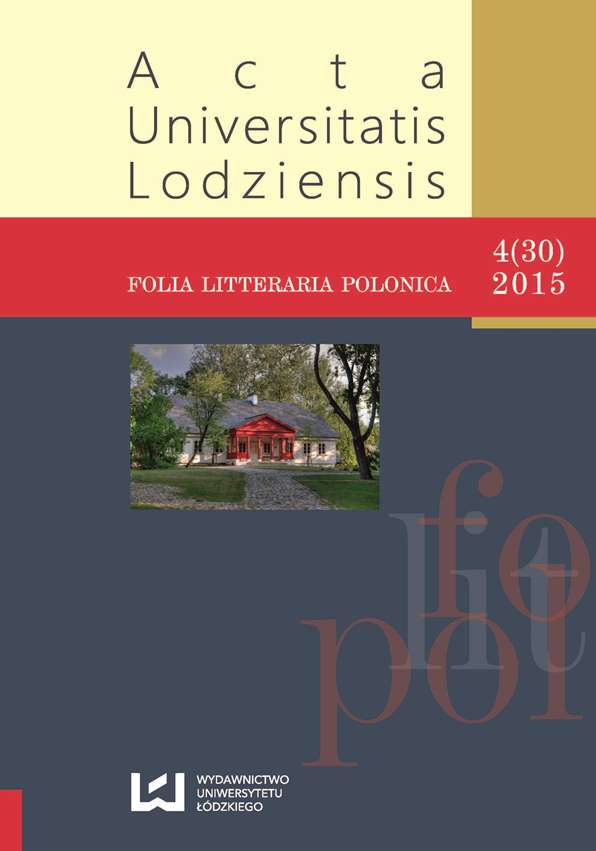Kłamstwo podmiotu – kłamstwo transcendencji. Studium opresji w „Pieśniach Maldorora” Comte de Lautréamonta
DOI:
https://doi.org/10.18778/1505-9057.30.03Słowa kluczowe:
romantyzm, gnoza, transcendencjaAbstrakt
The Songs of Maldoror are one of the most mysterious romantic writings. This Lautreamont’s main work wasn’t at first accepted by critics and readers. It wasn’t until an accidental discovery made by surrealists that the most known Ducasse’s writing began to be studied. The Songs… were considered to be the work of a lunatic, an emanation of wild and mad imagination, and the evidence of the author’s mental illness. Recently, however, scientists who had studied this writing, noticed that earlier critical judgements were not objective. The Songs are undoubtedly the kind of writing that teases, disturbs and raises ethical and aesthetic discord. That was the author’s main goal – to create writing of which the brutality and blasphemy snatches readers away from the bourgeois indifference. The Songs’… universe is a grotesque portrait of tyranny and power, which converge in the falsehoods of subject and transcendence. By exposing this deception one unveils the horrific truth about reality and the society. A truth in which culture becomes the space of ceaseless oppression – the prison from which there is nowhere to hide or escape.
Pobrania
Bibliografia
Bachelard Gaston, Bestiarium Lautréamonta, przeł. Henryk Chudak, „Pamiętnik Literacki” 1971, z. 2, s. 189–205.
Google Scholar
Breton André, Manifest surrealizmu (II), przeł. Adam Ważyk., http://www.nowakrytyka.pl/spip.php?article205 [dostęp: 30.05.2015].
Google Scholar
Foucault Michel, Wola wiedzy, w: tegoż, Historia seksualności, przeł. Bogdan Banasiak i Krzysztof Matuszewski, Czytelnik, Warszawa 1995, s. 13–118.
Google Scholar
Graaf Daniel A. De, Du nouveau sur la mort de Lautréamont, „Neophilologus” 1958, nr 42, s. 182–186.
Google Scholar
DOI: https://doi.org/10.1007/BF01511372
Haac Oscar A., Lautréamont’s Conversion: The Structure and Meaning of Poésies, „Modern Language Notes” 1950, nr 65, s. 182–186.
Google Scholar
DOI: https://doi.org/10.2307/2908744
Janion Maria, Wampir. Biografia symboliczna, Słowo/Obraz Terytoria, Gdańsk 2004.
Google Scholar
Janion Maria, Wobec zła, Verba, Chotomów 1989.
Google Scholar
Jocz Artur, O potrzebie gnozy, czyli jak literacko wyrazić naturę zła – cierpienia, w: Gnoza, gnostycyzm, literatura, red. B. Sienkiewicz, Zakład Wydawniczy Nomos, Kraków 2012, s. 97–111.
Google Scholar
Jonge Alex, Nightmare culture. Lautréamont and the „Chants de Maldoror”, St. Martin’s Press, New York 1973.
Google Scholar
Lautréamont Comte de, Pieśni Maldorora i Poezje, przeł. Maciej Żurowski, Państwowy Instytut Wydawniczy, Warszawa 1976.
Google Scholar
Legutko Ryszard, Eric Voegelin: polityka i transcendencja, „Znak” 1985, nr 9–10, s. 128–146.
Google Scholar
Nesselroth Peter W., Le jeux de la métaphore. Lautréamont: le sense de la forme, „Littérature” 1975, nr 17, s. 73–83.
Google Scholar
DOI: https://doi.org/10.3406/litt.1975.983
Norwid Cyprian, Pisma wszystkie, t. IX, zebrał, tekst ustalił, wstępem i uwagami krytycznymi opatrzył J.W. Gomulicki, Państwowy Instytut Wydawniczy, Warszawa 1971–1976.
Google Scholar
Praz Mario, Zmysły, śmierć i diabeł w literaturze romantycznej, przeł. Krzysztof Żaboklicki, Państwowy Instytut Wydawniczy, Warszawa 1974.
Google Scholar
Roux Jean-Paul, Krew. Mity, symbole, rzeczywistość, przeł. Marzena Chrobak, Znak, Kraków 2013.
Google Scholar
Shelley Percy, Prometeusz wyzwolony, przeł. i posłowiem opatrzył Leszek Elektorowicz, Wydawnictwo Literackie, Kraków 1982.
Google Scholar
Żurowski Maciej, Lautréamont i Mickiewicz, „Przegląd Humanistyczny” 1977, nr 1, s. 25–43.
Google Scholar
Pobrania
Opublikowane
Jak cytować
Numer
Dział
Licencja

Utwór dostępny jest na licencji Creative Commons Uznanie autorstwa – Użycie niekomercyjne – Bez utworów zależnych 4.0 Międzynarodowe.











